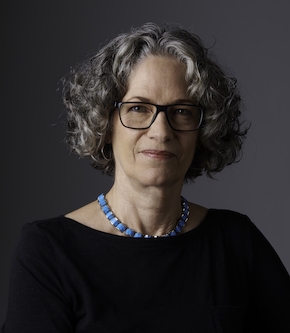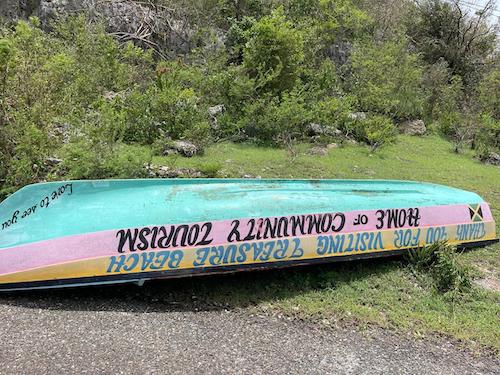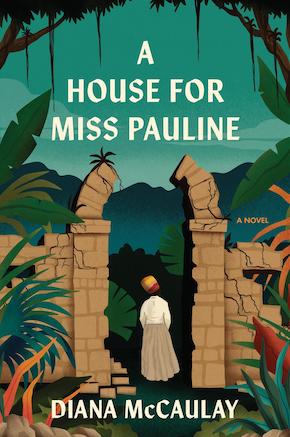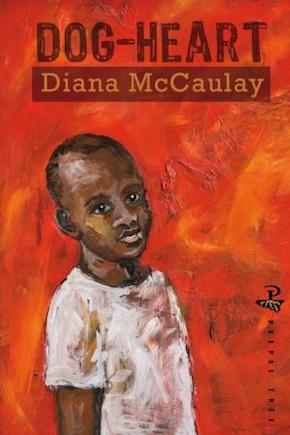Righting the canoe
by Diana McCaulayI WEPT WHEN I SAW the picture of the overturned canoe at the entrance to Treasure Beach. I knew Hurricane Beryl had hit Jamaica’s south coast hard, but I had not yet seen many pictures of what had happened partly because communications were – are – still down. I knew that there is no electricity or water, many homes were damaged or destroyed, farms were flattened. But that canoe – its lively colours still blazing, the hull intact, the metaphor transmitting, C’mon, people, I’m still here, help turn me over – well, I cried.
Treasure Beach, a collective name for a string of fishing and coastal villages on the south coast of Jamaica – Great Bay, Old Wharf, Calabash Bay, Billy’s Bay and Frenchman’s. A community of fishers and farmers, and more recently, small hotels, Airbnbs, villas, homestays. That rarity in Jamaica, a place where there are no barriers between visitors and Jamaicans.
This part of the island wasn’t part of my childhood, I can’t claim that. Nor have I ever been a resident. The first time I stayed there was sometime in the 1990s, when Sally Henzell had just started to construct basic one-room cottages on a headland covered in scratchy guinea grass. No air conditioning, but an outside shower. A path through the grass. Light coming through coloured glass set into the walls. The boom of the sea. Sally called it Jakes.
On the first morning I stayed there, I went in search of coffee towards what seemed to be a kitchen. The only table was a wooden cable reel. No coffee. Sally, who was there herself, told me there was a place down the road where I could get breakfast. We want visitors to integrate into the community, she said. I went back to Jakes a few more times in the 90s, and there were more cottages, then a seawater pool, then a coffee maker on a shelf. Treasure Beach was a place that made me feel child-like. Like I really didn’t need much, could stay in a bathing suit all day.
Help is being mobilised and there’s commitment to rebuilding, but restoration is going to take time, maybe a long time. And we are still at the beginning of the 2024 hurricane season.”
Then later, there was my environmental life. More development came to Treasure Beach and there were disagreements between families who had always lived there, farming and fishing, newcomers trying tourism, non-Jamaicans who bought property, environmental people like myself. We had seen the mistakes of the north coast and did not want that for Treasure Beach. Sally Henzell’s son, Jason, took me around once, with the young people from the Jamaica Environment Trust, and we saw the beaches where turtles came to nest, the unspoiled, rocky, dramatic coast of Back Seaside, the rising bulk of the Pedro Bluff. The local fishers I came to know explained to me how, coming from sea, once they saw the bluff, they knew they were nearly home. Sea walls were built, some beaches eroded, parts of the sand dunes were mined, a canal from the Great Pedro Pond was cut to drain it to the sea in case of flooding, but I feared the impacts of land-based pollution on the coral reefs.
And then, starting in 2001, there was the Calabash International Literary Festival, held at Jakes, on what must be the best stage of its kind – outside, the Caribbean Sea as backdrop. I went there first as a reader and a lover of the written word, but also someone who long cherished literary ambitions which had never been realised. I chickened out of reading my unfinished, raw work at open mic, but went to workshops, fangirled published authors, and bought as many books as I could carry. The bookshop was in a two-bedroom house on the sea, and later I would rent that little house and hope that the commitment to finally, finally finishing a novel and seeing it published would somehow seep into my bones from the walls of the Calabash bookshop.
And in 2010, it happened. I read at Calabash from my first novel, Dog-Heart. Yes, me, a 57-year-old unknown Caribbean writer, at a literary space designed by us for us, the only such festival I have ever been to (not that I have been to hundreds!) where the debut writers, the open mic performance poets and the headliners occupy the same stage and read to the same audience. At Calabash, we patrons were unruly, we moved the chairs although the organisers begged us not to, we staked out spaces under trees, we knew where to sit to catch the coolest breezes, where was hottest and to be avoided, we listened to some of the best writers anywhere read from their work. We welcomed them if they were from elsewhere and if they were from the Caribbean, we celebrated our own. Every available room in the area was rented, people from the community set up stalls and sold their crafts and food and after the literary part was done, we partied.
Now, writing this, I know St Elizabeth parish and Treasure Beach have been devastated by Hurricane Beryl, with roofs blown away, houses damaged, and trees and utility poles down for miles around. The Calabash stage survived and there is every hope the 2025 festival will go ahead as scheduled next May. Help is being mobilised and there’s commitment to rebuilding, but restoration is going to take time, maybe a long time. And we are still at the beginning of the 2024 hurricane season. I can only hope we rebuild with the full understanding that the game has changed, that due to the climate crisis hurricanes intensify faster, are stronger and wetter, and we must not restore exactly what was.
Except, that is, for the canoe.
Support the Greater Treasure Beach community via the American Friends of Jamaica: WE WILL RIGHT THE BOAT
@AFJcares
—

Diana McCaulay is a Jamaican environmental activist and novelist. Winner of the Gold Musgrave Medal, Jamaica’s highest award for lifetime achievement across the arts and sciences; twice Winner of the Commonwealth Short Story Prize for the Caribbean region (in 2022 and in 2012), she has also been shortlisted for the IMPAC Dublin Award, among other nominations, and is the winner of the Watson, Little 50 Prize for unrepresented writers aged 50+. Her novels include Dog-Heart (2010), Huracan (2012), Gone to Drift (2018) and Daylight Come (2020). Her latest, A House for Miss Pauline, is forthcoming from Dialogue Books in the UK and Algonquin in the US.
dianamccaulay.com
@dmccaulay
@dialoguepub
@AlgonquinBooks
Author photo by Jeremy Francis
The Calabash International Literary Festival was founded in 2001 by novelist Colin Channer, poet Kwame Dawes and producer Justine Henzell, with the aim of creating a world-class literary festival with roots in Jamaica and branches reaching out into the wider world. Now held biennially, the 16th staging is set for 23–25 May 2025.
calabashfestival.org
@calabashfest




